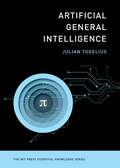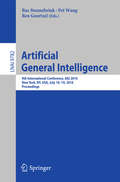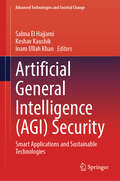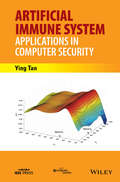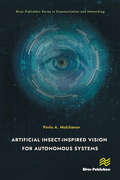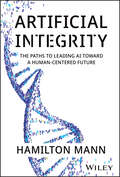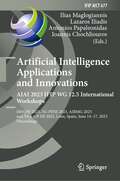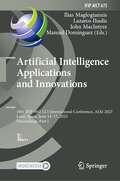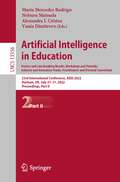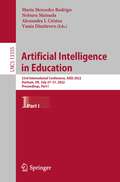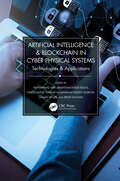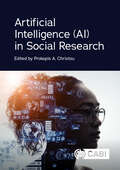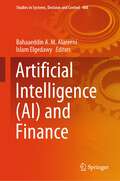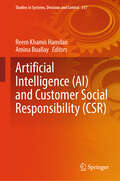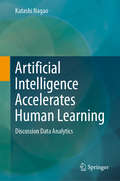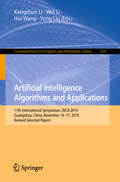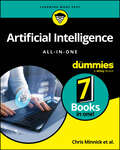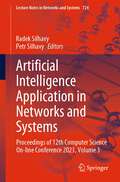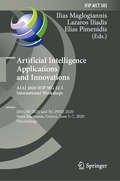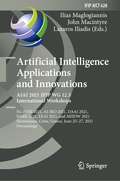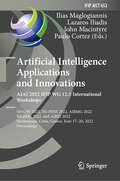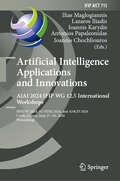- Table View
- List View
Artificial General Intelligence: 5th Workshop On Computer Games, Cgw 2016, And 5th Workshop On General Intelligence In Game-playing Agents, Giga 2016, Held In Conjunction With The 25th International Conference On Artificial Intelligence, Ijcai 2016, New York, Usa, July 9-10, 2016, Revised Selected Papers (The MIT Press Essential Knowledge series #705)
by Julian TogeliusHow to make AI capable of general intelligence, and what such technology would mean for society.Artificial intelligence surrounds us. More and more of the systems and services you interact with every day are based on AI technology. Although some very recent AI systems are generalists to a degree, most AI is narrowly specific; that is, it can only do a single thing, in a single context. For example, your spellchecker can’t do mathematics, and the world's best chess-playing program can’t play Tetris. Human intelligence is different. We can solve a variety of tasks, including those we have not seen before. In Artificial General Intelligence, Julian Togelius explores technical approaches to developing more general artificial intelligence and asks what general AI would mean for human civilization.Togelius starts by giving examples of narrow AI that have superhuman performance in some way. Interestingly, there have been AI systems that are superhuman in some sense for more than half a century. He then discusses what it would mean to have general intelligence, by looking at definitions from psychology, ethology, and computer science. Next, he explores the two main families of technical approaches to developing more general artificial intelligence: foundation models through self-supervised learning, and open-ended learning in virtual environments. The final chapters of the book investigate potential artificial general intelligence beyond the strictly technical aspects. The questions discussed here investigate whether such general AI would be conscious, whether it would pose a risk to humanity, and how it might alter society.
Artificial General Intelligence: 9th International Conference, AGI 2016, New York, NY, USA, July 16-19, 2016, Proceedings (Lecture Notes in Computer Science #9782)
by Ben Goertzel Bas Steunebrink Pei WangThis book constitutes the refereed proceedings of the 9th International Conference on Artificial General Intelligence, AGI 2016, held in New York City, NY, USA, in July 2016 as part of HLAI 2016, the Joint Multi-Conference on Human-Level Artificial Intelligence 2016. The 24 full papers, 2 short papers, and 10 poster papers presented were carefully reviewed and selected from 67 submissions. AGI research differs from the ordinary AI research by stressing on the versatility and wholeness of intelligence, and by carrying out the engineering practice according to an outline of a system comparable to the human mind inSelf a certain sense.
Artificial General Intelligence: Smart Applications and Sustainable Technologies (Advanced Technologies and Societal Change)
by Keshav Kaushik Inam Ullah Khan Salma El HajjamiThis book highlights a collection of state-of-the-art research on Safe Artificial General Intelligence (AGI), highlighting the crucial role of cybersecurity, smart applications, and sustainable technologies in ensuring a secure AI future. It illustrates the latest trends in AI safety, exploring the potential risks and dangers associated with AGI development and ways to prevent unintended consequences. The book discusses the convergence of various fields, such as AI, cybersecurity, smart applications, and sustainable technologies, by providing an overview of theoretical, practical, and simulation concepts of AGI. It also displays solutions that will help mitigate the risks and ensure the responsible and ethical development of AGI. It provides insights and perspectives from experts in these fields and offers a comprehensive guide to understanding the challenges and opportunities associated with the development of safe and secure AGI. The book includes chapters on various topics related to AGI security, including the ethical and legal aspects of AGI development, the role of explainability in ensuring transparency and accountability, the use of machine learning for intrusion detection and prevention, and the application of smart technologies for securing AGI systems. Additionally, it explores the impact of sustainable technologies on AGI security, such as the use of renewable energy sources to power AGI systems and the development of eco-friendly hardware. This book is a valuable source for researchers, students, and practitioners interested in the fields of artificial general intelligence, cybersecurity, smart applications, and sustainable technologies.
Artificial Immune System: Applications in Computer Security
by Ying TanThis book deals with malware detection in terms of Artificial Immune System (AIS), and presents a number of AIS models and immune-based feature extraction approaches as well as their applications in computer security. Covers all of the current achievements in computer security based on immune principles, which were obtained by the Computational Intelligence Laboratory of Peking University, China. Includes state-of-the-art information on designing and developing artificial immune systems (AIS) and AIS-based solutions to computer security issues. Presents new concepts such as immune danger theory, immune concentration, and class-wise information gain (CIG).
Artificial Insect-Inspired Vision for Autonomous Systems (River Publishers Series in Communications and Networking)
by Pavlo A. MolchanovThis book offers a straightforward explanation of groundbreaking artificial vision technology, which can provide limitless scalable resolution and lens-less, human-like vision with electronic control over focus, field of view, and direction. This advanced technology addresses the challenge of rapidly transferring large volumes of visual data for remote imaging systems.It also presents the novel artificial eye concept, the foundation of this vision technology. This eye can serve as a wearable device for visually impaired individuals, eliminating the need for surgery or implants. It offers significant advancements in long-distance vision with high resolution and automatic recognition of surrounding objects.The book also provides a concise overview of the architecture and benefits of nature-inspired antenna arrays and their potential applications, enhancing the reader’s understanding and the importance of the presented vision technology.Richly illustrated with colorful diagrams and straightforward explanations, this book is designed to facilitate understanding for readers with engineering backgrounds, customers, and students.
Artificial Integrity: The Paths to Leading AI Toward a Human-Centered Future
by Hamilton MannNavigating the transitions to the future of AI—Integrity over Intelligence Envision a world where artificial intelligence can deliver integrity-led outcomes seamlessly, adapting to diverse cultural context, value models, and situational nuances, countering subconscious biases, all while operating in an advanced human-centered manner. This is the promise of Artificial Integrity. In Artificial Integrity, digital strategist, technologist, doctoral researcher, acclaimed management thinker, and seasoned business executive Hamilton Mann emphasizes that the challenge of AI is in ensuring systems that exhibit integrity-led capabilities over the pursuit of mere general or super intelligence. Mann tackles the inadequacies of traditional ethical frameworks in handling the complexities of new AI technologies to make them trustworthy and reliable as they profoundly impact human lives. Introducing the transformative concept of “artificial integrity,” Mann proposes a paradigm shift, defining a “code of design” to ensure AI systems align with, amplify, and sustain human values and societal norms, maximizing integrity-led AI outcomes. Artificial Integrity discusses practical insights into driving a future where AI enhances, without replacing, human capabilities while being inclusive and reflective of diverse human experiences, emphasizing human agency. The book offers: Guiding posts and step-by-step solutions for designing, implementing and continuously aligning AI development to responsibly advance human and artificial co-intelligence Strategies and actionable advice for integrating AI into business and societal structures Practical paths toward managing the transition to the future of AI for human productivity and decision-making while maintaining sustainable trustworthiness Artificial Integrity is essential for anyone involved in AI development, from executives, business leaders, and managers to entrepreneurs, tech enthusiasts and policymakers. It's also perfect for laypeople interested in how AI intersects with society. Dive into this compelling and thought provoking read to ensure you are prepared for the challenges and opportunities that lie ahead in a human-centered AI-driven future.
Artificial Intelligence
by David L. Poole Alan K. MackworthConstraint-based reasoning is an important area of automated reasoning in artificial intelligence, with many applications. These include configuration and design problems, planning and scheduling, temporal and spatial reasoning, defeasible and causal reasoning, machine vision and language understanding, qualitative and diagnostic reasoning, and expert systems. Constraint-Based Reasoning presents current work in the field at several levels: theory, algorithms, languages, applications, and hardware. Constraint-based reasoning has connections to a wide variety of fields, including formal logic, graph theory, relational databases, combinatorial algorithms, operations research, neural networks, truth maintenance, and logic programming. The ideal of describing a problem domain in natural, declarative terms and then letting general deductive mechanisms synthesize individual solutions has to some extent been realized, and even embodied, in programming languages. Contents :- Introduction, E. C. Freuder, A. K. Mackworth. - The Logic of Constraint Satisfaction, A. K. Mackworth. - Partial Constraint Satisfaction, E. C. Freuder, R. J. Wallace. - Constraint Reasoning Based on Interval Arithmetic: The Tolerance Propagation Approach, E. Hyvonen. - Constraint Satisfaction Using Constraint Logic Programming, P. Van Hentenryck, H. Simonis, M. Dincbas. - Minimizing Conflicts: A Heuristic Repair Method for Constraint Satisfaction and Scheduling Problems, S. Minton, M. D. Johnston, A. B. Philips, and P. Laird. - Arc Consistency: Parallelism and Domain Dependence, P. R. Cooper, M. J. Swain. - Structure Identification in Relational Data, R. Dechter, J. Pearl. - Learning to Improve Constraint-Based Scheduling, M. Zweben, E. Davis, B. Daun, E. Drascher, M. Deale, M. Eskey. - Reasoning about Qualitative Temporal Information, P. van Beek. - A Geometric Constraint Engine, G. A. Kramer. - A Theory of Conflict Resolution in Planning, Q. Yang. A Bradford Book.
Artificial Intelligence Applications and Innovations. AIAI 2023 IFIP WG 12.5 International Workshops: MHDW 2023, 5G-PINE 2023, ΑΙBMG 2023, and VAA-CP-EB 2023, León, Spain, June 14–17, 2023, Proceedings (IFIP Advances in Information and Communication Technology #677)
by Lazaros Iliadis Ilias Maglogiannis Antonios Papaleonidas Ioannis ChochliourosThis book constitutes the refereed proceedings of four International Workshops, held as parallel events of the 19th IFIP WG 12.5 International Conference on Artificial Intelligence Applications and Innovations, AIAI 2023, held in León, Spain, during June 14–17, 2023: the 12th Workshop on Mining Humanistic Data (MHDW 2023); the 8th Workshop on “5G–Putting Intelligence to the Network Edge (5G-PINE 2023); the second Workshop on AI in Energy, Buildings and Micro-Grids Workshop (ΑΙBMG 2023); and the First Workshop on Visual Analytics Approaches for Complex Problems in Engineering and Biomedicine" (VAA-CP-EB 2023). This event was held in hybrid mode. The 37 regular papers presented at these workshops were carefully reviewed and selected from 86 submissions.
Artificial Intelligence Applications and Innovations: 19th IFIP WG 12.5 International Conference, AIAI 2023, León, Spain, June 14–17, 2023, Proceedings, Part I (IFIP Advances in Information and Communication Technology #675)
by Lazaros Iliadis Ilias Maglogiannis John MacIntyre Manuel DominguezThis two-volume set of IFIP-AICT 675 and 676 constitutes the refereed proceedings of the 19th IFIP WG 12.5 International Conference on Artificial Intelligence Applications and Innovations, AIAI 2023, held in León, Spain, during June 14–17, 2023. This event was held in hybrid mode. The 75 regular papers and 17 short papers presented in this two-volume set were carefully reviewed and selected from 185 submissions. The papers cover the following topics: Deep Learning (Reinforcement/Recurrent Gradient Boosting/Adversarial); Agents/Case Based Reasoning/Sentiment Analysis; Biomedical - Image Analysis; CNN - Convolutional Neural Networks YOLO CNN; Cyber Security/Anomaly Detection; Explainable AI/Social Impact of AI; Graph Neural Networks/Constraint Programming; IoT/Fuzzy Modeling/Augmented Reality; LEARNING (Active-AutoEncoders-Federated); Machine Learning; Natural Language; Optimization-Genetic Programming; Robotics; Spiking NN; and Text Mining /Transfer Learning.
Artificial Intelligence in Education. Posters and Late Breaking Results, Workshops and Tutorials, Industry and Innovation Tracks, Practitioners’ and Doctoral Consortium: 23rd International Conference, AIED 2022, Durham, UK, July 27–31, 2022, Proceedings, Part II (Lecture Notes in Computer Science #13356)
by Alexandra I. Cristea Vania Dimitrova Maria Mercedes Rodrigo Noburu MatsudaThis two-volume set LNAI 13355 and 13356 constitutes the refereed proceedings of the 23rd International Conference on Artificial Intelligence in Education, AIED 2022, held in Durham, UK, in July 2022.The 40 full papers and 40 short papers presented together with 2 keynotes, 6 industry papers, 12 DC papers, 6 Workshop papers, 10 Practitioner papers, 97 Posters and Late-Breaking Results were carefully reviewed and selected from 243 submissions. The conference presents topics such as intelligent systems and the cognitive sciences for the improvement and advancement of education, the science and engineering of intelligent interactive learning systems. The theme for the AIED 2022 conference was „AI in Education: Bridging the gap between academia, business, and non-pro t in preparing future-proof generations towards ubiquitous AI."
Artificial Intelligence in Education: 23rd International Conference, AIED 2022, Durham, UK, July 27–31, 2022, Proceedings, Part I (Lecture Notes in Computer Science #13355)
by Alexandra I. Cristea Vania Dimitrova Maria Mercedes Rodrigo Noburu MatsudaThis two-volume set LNAI 13355 and 13356 constitutes the refereed proceedings of the 23rd International Conference on Artificial Intelligence in Education, AIED 2022, held in Durham, UK, in July 2022.The 40 full papers and 40 short papers presented together with 2 keynotes, 6 industry papers, 12 DC papers, 6 Workshop papers, 10 Practitioner papers, 97 Posters and Late-Breaking Results were carefully reviewed and selected from 243 submissions. The conference presents topics such as intelligent systems and the cognitive sciences for the improvement and advancement of education, the science and engineering of intelligent interactive learning systems. The theme for the AIED 2022 conference was „AI in Education: Bridging the gap between academia, business, and non-pro t in preparing future-proof generations towards ubiquitous AI."
Artificial Intelligence & Blockchain in Cyber Physical Systems: Technologies & Applications
by Muhammad Arif Faseeh QureshiThis book explores the intersection of blockchain technology, artificial intelligence (AI) and cyber physical systems (CPS). It discusses how these technologies can be integrated to create secure and efficient CPS solutions. The book covers various topics, including the basics of blockchain and AI, their applications in CPS and the challenges of integrating these technologies. It also explores real-world examples of how blockchain and AI are used in CPS, such as smart cities, transportation systems and healthcare. The authors delve into the technical aspects of how blockchain and AI can be used together to enhance CPS security, data privacy and interoperability. They also discuss the potential benefits and limitations of these technologies and provide insights into the future of CPS. Overall, this book provides a comprehensive overview of the use of blockchain and AI in CPS, making it a valuable resource for researchers, professionals and students in the fields of computer science, engineering and cybersecurity.
Artificial Intelligence (2nd edition)
by Patrick H. WinstonThis is an eagerly awaited revision of the single bestselling introduction to Artificial Intelligence ever published. It retains the best features of the earlier works including superior readability, currency, and excellence in the selection of the examples.
Artificial Intelligence (AI) in Social Research
The field of social research is characterized by its broad scope and interdisciplinary nature, encompassing the examination of human behaviour, societies, and various facets of social existence; however, it is influenced by numerous factors, including technological advancements. It is therefore no surprise that Artificial Intelligence (AI) has rapidly become a driving force, bringing about substantial transformations within the field. The use of AI-assisted tools and programmes for the collection, analysis, and interpretation of both quantitative and qualitative data is increasing at a remarkable pace. The implications of utilizing these applications are significant and noteworthy. While these technologies present numerous opportunities, it is important to acknowledge the accompanying dilemmas and risks associated with this form of technological advancement. With a focus on AI's research implications, this book explores various considerations and examples across different disciplines of social research. It highlights the considerable promise AI holds for revolutionizing the discipline while also guiding readers in contemplating the potential drawbacks and various concerns. By doing so, researchers can optimize the capabilities of AI and promote its responsible, reliable, and beneficial application in enhancing and advancing social research.
Artificial Intelligence (Studies in Systems, Decision and Control #488)
by Islam Elgedawy Bahaaeddin A. M. AlareeniArtificial intelligence (AI) has the potential to significantly improve efficiency, reduce costs, and increase the speed and accuracy of financial decision-making, making it an increasingly important tool for financial professionals. One way that AI can improve efficiency in finance is by automating tasks and processes that are time-consuming and repetitive for humans. For example, AI algorithms can be used to analyze and process large amounts of data, such as financial statements and market data, in a fraction of the time that it would take a human to do so. This can allow financial professionals to focus on higher-value tasks, such as interpreting data and making strategic decisions, rather than being bogged down by mundane tasks. AI can also reduce costs in finance by increasing automation and eliminating the need for certain tasks to be performed manually. This can result in cost savings for financial institutions, which can then be passed on to customers in the form of lower fees or better services. AI can be used to identify unusual patterns of activity that may indicate fraudulent behavior. This can help financial institutions reduce losses from fraud and improve customer security. AI-powered chatbots and virtual assistants can help financial institutions provide faster, more efficient customer service, particularly when it comes to answering common questions and handling routine tasks. Some financial institutions are using AI to analyze market data and make trades in real-time. AI-powered trading algorithms can potentially make faster and more accurate trading decisions than humans. In terms of speed and accuracy, AI algorithms can analyze data and make decisions much faster than humans, and can do so with a high degree of accuracy. This can be particularly useful in fast-moving financial markets, where quick and accurate decision-making can be the difference between success and failure.This book highlights how AI in finance can improve efficiency, reduce costs, and increase the speed and accuracy of financial decision-making. Moreover, the book also focuses on how to ensure the responsible and ethical use of AI in finance.This book is a valuable resource for students, scholars, academicians, researchers, professionals, executives, government agencies, and policymakers interested in exploring the role of artificial intelligence (AI) in finance. Its goal is to provide a comprehensive overview of the latest research and knowledge in this area, and to stimulate further inquiry and exploration.
Artificial Intelligence (Studies in Systems, Decision and Control #517)
by Reem Khamis Hamdan Amina BuallayThe impact of artificial intelligence (AI) on business and society has been significant, with the incorporation of AI technologies such as robots, facial recognition, algorithms, and natural language processing into business leading to both corporate benefits and potential challenges for stakeholders. The question of how to engage in responsible business practices in the era of AI is an important one, and there is a need for more research on the relationship between AI and corporate social responsibility (CSR). As AI becomes more prevalent, there is a growing focus on the ethical implications of AI and the potential for AI to perpetuate biases or to displace human workers. CSR initiatives can include considerations of ethical AI in the development and use of AI systems. AI has the potential to solve many global challenges and improve people's lives, but it can also have negative consequences if not developed and used responsibly. CSR initiatives can focus on the social impact of AI,including efforts to ensure that the benefits of AI are distributed fairly and that AI is used for the common good. CSR initiatives often involve engaging with stakeholders, including employees, customers, and communities, to understand their needs and concerns and to ensure that their interests are taken into account. This can include engaging with stakeholders about the use of AI in the organization and its potential impactsThe adoption of AI in business is changing many aspects of doing business in a socially responsible manner, and there is a need to examine the potential unethical behaviors and novel ways of engaging in CSR that may arise. This book aims to focus on AI and CSR, and to advance our understanding of the role of AI in organizations and the literature on CSR by assembling high-quality papers with a strong connection between theory and practice.
Artificial Intelligence Accelerates Human Learning: Discussion Data Analytics
by Katashi NagaoFocusing on students’ presentations and discussions in laboratory seminars, this book presents case studies on evidence-based education using artificial intelligence (AI) technologies. It proposes a system to help users complete research activities, and a machine-learning method that makes the system suitable for long-term operation by performing data mining for discussions and automatically extracting essential tasks. By illustrating the complete process – proposal, implementation, and operation – of applying machine learning techniques to real-world situations, the book will inspire researchers and professionals to develop innovative new applications for education. The book is divided into six chapters, the first of which provides an overview of AI research and practice in education. In turn, Chapter 2 describes a mechanism for applying data analytics to student discussions and utilizing the results for knowledge creation activities such as research. Based on discussion data analytics, Chapter 3 describes a creative activity support system that effectively utilizes the analytical results of the discussion for subsequent activities. Chapter 4 discusses the incorporation of a gamification method to evaluate and improve discussion skills while maintaining the motivation to participate in the discussion. Chapters 5 and 6 describe an advanced learning environment for honing students’ discussion and presentation skills. Two important systems proposed here are a presentation training system using virtual reality technologies, and an interactive presentation/discussion training system using a humanoid robot. In the former, the virtual space is constructed by measuring the three-dimensional shape of the actual auditorium, presentations are performed in the same way as in the real world, and the AI as audience automatically evaluates the presentation and provides feedback. In the latter, a humanoid robot makes some remarks on and asks questions about students’ presentations, and the students practice responding to it.
Artificial Intelligence Algorithm Design for Systems: Proceedings of 13th Computer Science Online Conference 2024, Volume 3 (Lecture Notes in Networks and Systems #1120)
by Radek Silhavy Petr SilhavyThis volume delves into the application of Artificial Intelligence within systems and network environments. Highlighted papers investigate the latest in neural network applications, optimisation strategies, and hybrid bio-inspired algorithms. It includes the rigorously reviewed proceedings of the Artificial Intelligence Application in Networks and Systems session of the 13th Computer Science Online Conference 2024 (CSOC 2024), held online in April 2024.
Artificial Intelligence Algorithms and Applications: 11th International Symposium, ISICA 2019, Guangzhou, China, November 16–17, 2019, Revised Selected Papers (Communications in Computer and Information Science #1205)
by Wei Li Yong Liu Kangshun Li Hui WangThis book constitutes the thoroughly refereed proceedings of the 11th International Symposium on Intelligence Computation and Applications, ISICA 2019, held in Guangzhou, China, in November 2019.The 65 papers presented were carefully reviewed and selected from the total of 112 submissions. This volume features the most up-to-date research in evolutionary algorithms, parallel computing and quantum computing, evolutionary multi-objective and dynamic optimization, intelligent multimedia systems, virtualization and AI applications, smart scheduling, intelligent control, big data and cloud computing, deep learning, and hybrid machine learning systems.The papers are organized according to the following topical sections: new frontier in evolutionary algorithms; evolutionary multi-objective and dynamic optimization; intelligent multimedia systems; virtualization and AI applications; smart scheduling; intelligent control; big data and cloud computing; statistical learning.
Artificial Intelligence All-in-One For Dummies
by John Paul Mueller Sheryl Lindsell-Roberts Paul Mladjenovic Stephanie Diamond Shiv Singh Chris Minnick Luca Massaron Daniel Stanton Pam Baker Jeffrey AllanA comprehensive roadmap to using AI in your career and in your life Artificial intelligence is everywhere. Major software organizations like Microsoft, Google, and Apple have built AI directly into products and invited the world to become part of the AI revolution. And it's impossible to use these tools to their fullest potential without understanding the basics of what AI is and what it can do. Artificial Intelligence All-in-One For Dummies compiles insight from the expert authors of AI books in the For Dummies series to provide an easy-to-follow walkthrough for anyone interested in learning how to use AI. You'll learn how to put artificial intelligence to work for you and your company in a wide variety of situations, from creating office assistants to managing projects and marketing your products. Inside the book: How to prompt AI platforms like ChatGPT and Copilot while avoiding “hallucinations” and other bugs Strategies for adding artificial intelligence tools to your company's existing workflows to improve efficiency and generate new opportunities Techniques to improve your programming capabilities with AI or create new AI-powered tools Perfect for professionals curious about the potential and pitfalls associated with generative artificial intelligence, Artificial Intelligence All-in-One For Dummies shows you exactly how AI works and how you can apply it in your own professional and personal life.
Artificial Intelligence Application in Networks and Systems: Proceedings of 12th Computer Science On-line Conference 2023, Volume 3 (Lecture Notes in Networks and Systems #724)
by Radek Silhavy Petr SilhavyThe application of artificial intelligence in networks and systems is a rapidly evolving field that has the potential to transform a wide range of industries. The refereed proceedings in this book is from the Artificial Intelligence Application in Networks and Systems session of the Computer Science Online Conference 2023 (CSOC 2023), which was held online in April 2023. The section brings together experts from different fields to present their research and discuss the latest trends and challenges. One of the key themes in this section is the development of intelligent systems that can learn, adapt, and optimize their performance in real time. Researchers are exploring how AI algorithms can be used to create autonomous networks and systems that can make decisions without human intervention. Furthermore, this section highlights the use of AI in improving network performance and efficiency. Researchers are exploring how AI algorithms can be used to optimize network routing, reduce congestion, and improve the quality of service. These efforts can help organizations save costs and improve user experience.
Artificial Intelligence Applications and Innovations. AIAI 2020 IFIP WG 12.5 International Workshops: MHDW 2020 and 5G-PINE 2020, Neos Marmaras, Greece, June 5–7, 2020, Proceedings (IFIP Advances in Information and Communication Technology #585)
by Elias Pimenidis Lazaros Iliadis Ilias MaglogiannisThis book constitutes the refereed proceedings of two International Workshops held as parallel events of the 16th IFIP WG 12.5 International Conference on Artificial Intelligence Applications and Innovations, AIAI 2020, in Neos Marmaras, Greece, in June 2020: the 9th Mining Humanistic Data Workshop, MHDW 2020, and the 5th Workshop on 5G-Putting Intelligence to the Network Edge, 5G-PINE 2020.* The 6 full papers and 3 short papers presented at MHDW 2020 were carefully reviewed and selected from 16 submissions; out of the 23 papers submitted to 5G-PINE 2020, 11 were accepted as full papers and 1 as a short paper. The MHDW papers focus on topics such as recommendation systems, sentiment analysis, pattern recognition, data mining, and time series. The papers presented at 5G-PINE focus on the latest AI applications in the telecommunication industry and deal with topics such as the Internet of Things, intelligence fusion in 5G networks, and 5G media.*The workshops were held virtually due to the COVID-19 pandemic.
Artificial Intelligence Applications and Innovations. AIAI 2021 IFIP WG 12.5 International Workshops: 5G-PINE 2021, AI-BIO 2021, DAAI 2021, DARE 2021, EEAI 2021, and MHDW 2021, Hersonissos, Crete, Greece, June 25–27, 2021, Proceedings (IFIP Advances in Information and Communication Technology #628)
by Lazaros Iliadis Ilias Maglogiannis John MacintyreThis book constitutes the refereed proceedings of six International Workshops held as parallel events of the 17th IFIP WG 12.5 International Conference on Artificial Intelligence Applications and Innovations, AIAI 2021, virtually and in Hersonissos, Crete, Greece, in June 2021: the 6th Workshop on 5G-Putting Intelligence to the Network Edge, 5G-PINE 2021; Artificial Intelligence in Biomedical Engineering and Informatics Workshop, AI-BIO 2021; Workshop on Defense Applications of AI, DAAI 2021; Distributed AI for Resource-Constrained Platforms Workshop, DARE 2021; Energy Efficiency and Artificial Intelligence Workshop, EEAI 2021; and the 10th Mining Humanistic Data Workshop, MHDW 2021. The 24 full papers and 16 short papers presented at these workshops were carefully reviewed and selected from 72 submissions. The papers presented at 5G-PINE focus on the latest AI applications in the telecommunication industry and AI in modern 5G-oriented telecommunications infrastructures. The papers chosen for AI-BIO 2021 present research on the subject of AI, in its broadest sense, in biomedical engineering and health informatics. The DAAI 2021 papers aim at presenting recent evolutions in artificial intelligence applicable to defense and security applications. The papers selected for DARE 2021 address a variety of pertinent and challenging topics within the scope of distributed AI for resource-constrained platforms. The papers presented at EEAI 2021 aim to bring together interdisciplinary approaches that focus on the application of AI-driven solutions for increasing and improving energy efficiency of residential and tertiary buildings and of occupant behavior. The MHDW papers focus on topics such as recommendation systems, sentiment analysis, pattern recognition, data mining, and time series.
Artificial Intelligence Applications and Innovations. AIAI 2022 IFIP WG 12.5 International Workshops: MHDW 2022, 5G-PINE 2022, AIBMG 2022, ML@HC 2022, and AIBEI 2022, Hersonissos, Crete, Greece, June 17–20, 2022, Proceedings (IFIP Advances in Information and Communication Technology #652)
by Paulo Cortez Lazaros Iliadis Ilias Maglogiannis John MacintyreThis book constitutes the refereed proceedings of five International Workshops held as parallel events of the 18th IFIP WG 12.5 International Conference on Artificial Intelligence Applications and Innovations, AIAI 2022, virtually and in Hersonissos, Crete, Greece, in June 2022: the 11th Mining Humanistic Data Workshop (MHDW 2022); the 7th 5G-Putting Intelligence to the Network Edge Workshop (5G-PINE 2022); the 1st workshop on AI in Energy, Building and Micro-Grids (AIBMG 2022); the 1st Workshop/Special Session on Machine Learning and Big Data in Health Care (ML@HC 2022); and the 2nd Workshop on Artificial Intelligence in Biomedical Engineering and Informatics (AIBEI 2022). The 35 full papers presented at these workshops were carefully reviewed and selected from 74 submissions.
Artificial Intelligence Applications and Innovations. AIAI 2024 IFIP WG 12.5 International Workshops: MHDW 2024, 5G-PINE 2024, and ΑΙ4GD 2024, Corfu, Greece, June 27-30, 2024, Proceedings (IFIP Advances in Information and Communication Technology #715)
by Ioannis Karydis Lazaros Iliadis Ilias Maglogiannis Antonios Papaleonidas Ioannis ChochliourosThis book constitutes the refereed proceedings of three International Workshops held as parallel events of the IFIP WG 12.5 International Workshops on Artificial Intelligence Applications and Innovations, AIAI 2024, held in Corfu, Greece, during June 27-30, 2024. The 30 full papers and 4 short papers presented in this book were carefully reviewed and selected from 69 submissions. AIAI 2024 Workshop volume presents papers from the following three workshops: 13th event of the International Mining Humanistic Data Workshop (MHDW 2024) 9th 5G-PINE Workshop (5G-PINE 2024) 1st Workshop on AI Applications for Achieving the Green Deal Targets (ΑΙ4GD 2024).
